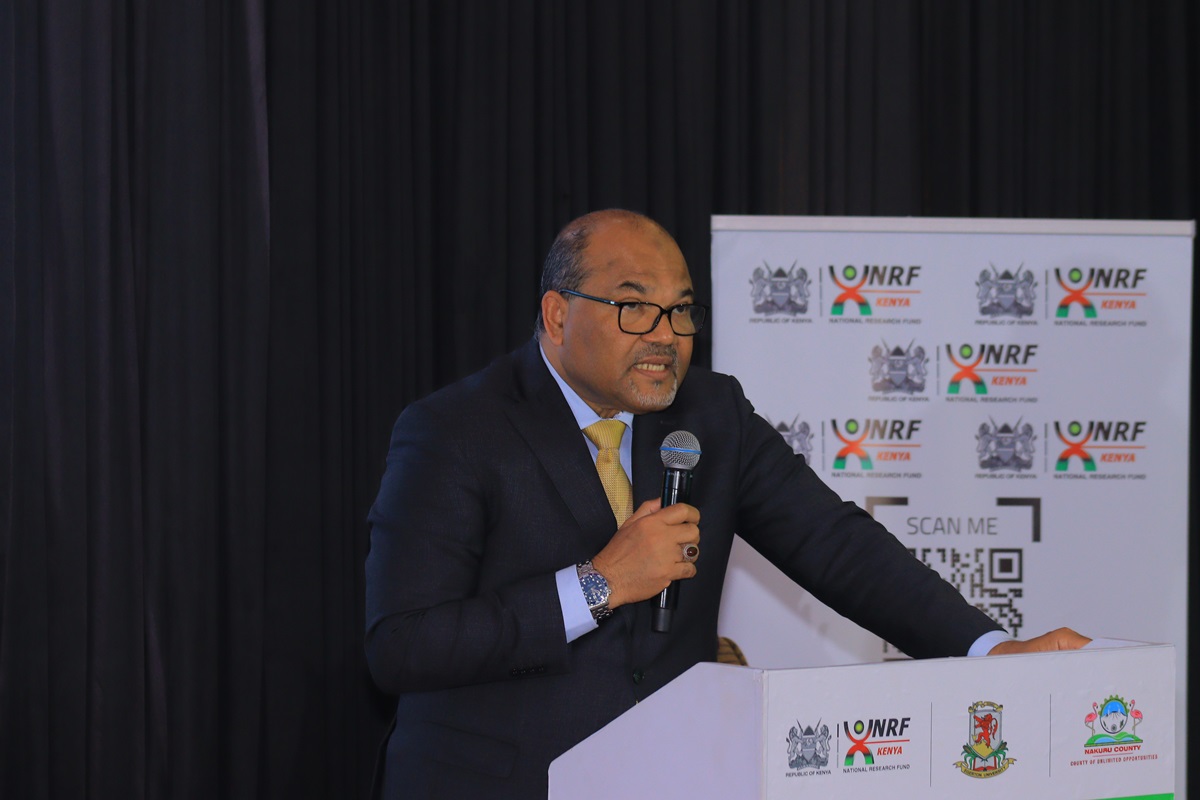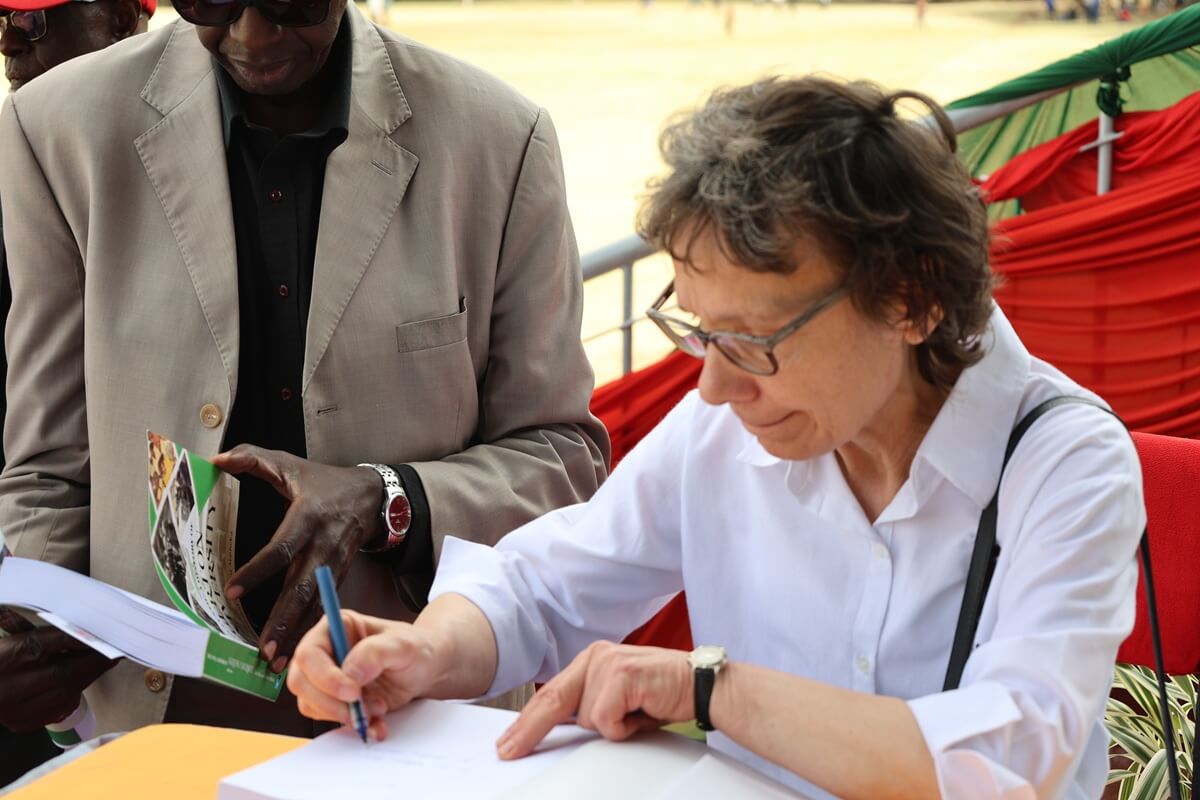Principal Secretary Closes a Milestone Gathering
The Kenya National Research Festival drew to a close at Egerton University on 22 August 2025 with a strong call for translating science into tangible solutions for society. Presiding over the closing ceremony, Prof. Shaukat Abdulrazak, Principal Secretary in the State Department for Science, Research and Innovation, emphasised that the country’s development depends on how effectively research outcomes are turned into practical tools for communities.
“We live with renewed clarity. Kenya’s development hinges on how we translate science into solutions and how we scale those solutions with our communities,” he said.
Prof. Abdulrazak noted that the week-long event had brought together a wide range of participants. “This festival has been inclusive. We had students, policymakers, researchers, farmers, partners and donors,” he said. He highlighted the value of the interactions, from students who presented prototypes, to farmers seeking new knowledge, and to legislators searching for evidence that could inform policy.
The Principal Secretary stressed the importance of linking universities, industry and society to ensure that science responds directly to community needs. “It is very prudent that we look at what we do from the scientific point of view and how we address the challenges of society,” he said. He called for financing models that prioritise results, making clear that “funding should buy results, not activities.”

Prof. Shaukat Abdulrazak, Principal Secretary for Science, Research and Innovation, delivers the closing address at the Kenya National Research Festival at Egerton University.
In a message tailored to the host institution, Prof. Abdulrazak responded to an appeal for assistance in completing Egerton University’s unfinished Agronomy Complex. He said he would engage partners, including the International Atomic Energy Agency, to explore ways of finishing the project under a Public-Private Partnership model. Once completed, the complex is expected to house laboratories dedicated to food safety and agricultural research.
A Week of Discussions and Discoveries
The closing ceremony offered an opportunity to reflect on the intensive programme that unfolded across the five days of the festival. The Director of Research and Extension at Egerton University, Prof. George Owuor, summarised the week’s deliberations, which had covered a broad spectrum of issues central to Kenya’s development agenda.
The first day of the festival interrogated the policy environment for research and innovation. Participants identified significant gaps and called for legislative adjustments to strengthen the sector. On the second day, attention turned to climate resilience, with discussions focusing on conservation of resources and the enforcement of regulations in the context of climate change.
Livestock productivity and value chains dominated the third day. Presenters emphasised the need for improved diversity, commercialization and quality within livestock systems, noting their importance in climate adaptation and rural livelihoods.
The fourth day was devoted to circular food systems. Delegates noted the extent of food wastage in the country and proposed approaches to recycle byproducts into useful resources. There was a call to harness digital platforms and technology to support such innovations. The day concluded with a strong emphasis on food safety, recognised as a pressing challenge for the region.
On the final day, young people took centre stage. Youth representatives demanded inclusion in every stage of research, innovation, outreach and food safety work. “The youths brought up some gaps that need addressing in making sure of inclusivity. They want to be involved in every point in research, innovations, agricultural outreach, and food safety,” Prof. Owuor reported.
He concluded by noting that the festival had helped identify key priorities for the country’s research agenda and thanked the National Research Fund (NRF) for bringing together a wide range of stakeholders.
National Research Fund Charts the Next Phase
The Chief Executive Officer of NRF, Prof. Dickson Andala, officially welcomed guests to the closing ceremony. He noted that the festival was significant because it had been held “close to the people,” allowing farmers and youth to engage directly with scientists and policymakers. He paid tribute to the over 55 exhibitors who participated, showcasing innovations that demonstrated the breadth of research taking place across the country.
The closing ceremony also featured awards for innovators and exhibitors, including researchers from Egerton University. Prof. Andala called for stronger efforts to commercialize the ideas and technologies that had attracted public interest during the exhibitions.

A group photo after the closing of the Kenya National Research Festival at Egerton University.
Looking ahead, he announced that the next edition of the Kenya National Research Festival will be held in 2026 in Mombasa under the theme of the blue economy.
Egerton University’s Contribution Recognised
The Deputy Vice Chancellor in charge of Academics, Research and Extension, Prof. Bernard Aduda, delivered remarks on behalf of the Vice Chancellor. He commended the dedication of Egerton staff in organising the festival and recognised the role of Egerton researchers in the Local Organising Committee chaired by Prof. Japheth Onyando.
Prof. Aduda reflected on the significance of the event for the university. “Many people who came, including farmers and exhibitors, appreciated what goes on in a public university associated with agriculture,” he said. He noted that the recommendations emerging from the festival had far-reaching implications and expressed optimism that they would be channelled to relevant institutions for action.
Turning to Egerton’s own priorities, he made a strong case for government support in completing the Agronomy Complex. He explained that one wing of the building was being completed to host state of the art laboratories under the International Centre for Genetic Engineering and Biotechnology, but urged support to finalise the other wing. He said this would enable the university to dedicate it to nuclear techniques for peaceful uses in agriculture.
“The building, when completed, will contribute significantly to food security and food safety in the country,” he said. He stressed that research capacity in agriculture is essential for meeting international standards, which in turn are necessary for Kenyan products to access global markets.
Shared Commitment to Research and Innovation
The closing ceremony captured the broad themes that defined the week. Policymakers pointed to legislative reforms, researchers outlined scientific solutions, and farmers and youth called for practical engagement. The Principal Secretary summed it up by stressing inclusivity, accountability and results in the use of research funding.
The festival highlighted how universities, government, industry and communities can work together to address national challenges.







